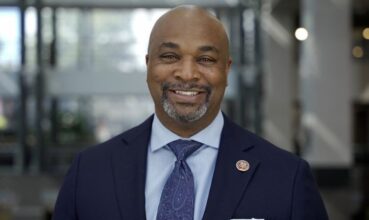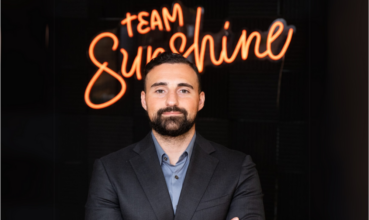

In today’s dynamic property management landscape, success hinges on balancing rapid growth with a dedication to quality service. CALCAP Properties stands out as a rising star in this secto...




In a conversation with KeyCrew Journal, Weinstock shared insights from his journey from reluctant law school graduate to commercial real estate leader, his commitment to mentorship through DePaul University’s Real Estate Center, and his perspective on why today’s challenging market may be the perfect time for newcomers to enter the industry.
“I’m a silver lining guy. I look for what’s possible. The glass is always half full, but there’s room for more,” says Steven D. Weinstock, Senior Vice President at Marcus & Millichap, capturing the entrepreneurial mindset that has defined his three-decade career in commercial real estate.
Weinstock’s career began with a moment of clarity that changed his trajectory forever. After completing law school at Wayne State University in Detroit, Michigan, he had a prestigious job offer in hand when he realized the legal profession wasn’t his calling.
“I stopped at the firm and said, ‘I can’t do this.’ And they all said, ‘What do you mean?’ I said, ‘I can’t react to issues. I have to go out and create,'” Weinstock recalls. “The partner said, ‘Yeah, we all knew that. We didn’t know you knew that.'”
This realization led him to commercial real estate in the late 1980s, where his introduction to the industry was decidedly old-school: “My first day was truly a desk, a phone, and this big, thick stack of yellow pages. I said to the boss, ‘So what do I do?’ He said, ‘Well, you call building owners.’ I said, ‘How do I know who the building owners are?’ He said, ‘That’s what the Yellow Pages is for.'”
Weinstock struggled initially until a mentor took him under his wing with clear direction: “You’re going to leave every morning before 8:30, you’re going to knock on doors for tenants in the area where we assign you, you’re going to ask them about moving, you’re going to walk the buildings, and you’re going to come back after 4:30 in the afternoon.”
This structured approach to prospecting proved successful, leading Weinstock to build his own business with approximately 3.5-4 million square feet of management and brokerage, which he eventually sold to Trammel Crow. After discovering that corporate culture wasn’t a fit for his entrepreneurial spirit, he bought back his business, sold it to a mid-sized local firm, and focused exclusively on investment sales.
“I liked it. It was part analytical, it was part sales, it was part strategic thinking. It really used a lot of my brain,” he explains.
After eight successful years as a broker with Marcus & Millichap in Detroit, Weinstock was approached about transitioning to management. Despite initial hesitation “But I’m a broker. I am doing really well” he accepted the challenge, eventually landing in Chicago’s Oak Brook office.
“Last place office in the firm in 2009, and I think last year we finished in the top ten,” Weinstock notes with pride. “We gutted it to its core, and rebuilt it over the last 16 years. I couldn’t be more proud of the men and women that I work with.”
For someone with Weinstock’s entrepreneurial background, finding fulfillment within a large organization might seem challenging. However, he credits Marcus & Millichap’s unique structure for allowing him to maintain that entrepreneurial drive while fostering collaboration.
“What makes Marcus & Millichap unique is that you’re in an office where the tools and the resources and the mentality is very collaborative,” he explains. “If you look at most brokerage firms, good brokers work in a silo. They’re double-ending most of their deals. They’re really not networking within their office.”
In contrast, Marcus & Millichap created an environment where specialists in different product types and areas collaborate to serve clients’ broader needs. This approach not only benefits clients but also feeds the entrepreneurial spirit of brokers who can participate in deals outside their immediate specialty.
“As a manager, I’m actually aligned with each one of these people in their businesses, and I’m helping them facilitate it with each other,” Weinstock says. “I treated the office as my responsibility, I took accountability for the people I worked, I remembered that George Marcus & Bill Millichap’s names were on the front door. What an amazing opportunity I was offered.”
This balance between entrepreneurship and collaboration has kept Weinstock engaged for 24 years at the company, far longer than the 15 years he spent at various firms earlier in his career.
Weinstock’s involvement with DePaul University began shortly after arriving in Chicago, when he was approached by Suzanne Cannon, then director of the Real Estate Center, about mentoring students.
“She said, ‘Would you be willing to be a mentor for some of our students?’ And I said, ‘Wow, we don’t even know each other that well, and you want me to influence your students?’ And she said, ‘Oh, no, I’ve sized you up.'”
That initial mentorship experience with a senior undergraduate student proved transformative for Weinstock. “While I had an idea of what a mentor should be, there’s a lot to learn to be a really good mentor. And Suzanne helped me.”
His involvement expanded when he was invited to participate in DePaul’s collegiate career fair, which brings together students not just from DePaul but from other institutions like Indiana, Marquette, and the University of Illinois.
“Being able to sit at tables with sophomores and juniors and seniors and hear what they’re doing and being able to give them ideas and guidance, it appeals to me,” Weinstock says. “First of all, it’s fulfilling. Second of all, it created a tie to another organization I am involved with, the Eisenberg Foundation [for gastrointestinal cancer research and education]. Third of all, and maybe most importantly, these are people that you want to hire to work with. Talk about a trifecta.”
The impact of this mentorship is tangible. Weinstock recently received an email from a student who had attended one of his sessions at the DePaul collegiate fair. “Mr. Weinstock, hope you remember me. I met you at the DePaul collegiate fair. I finished what you said, and I’d love to talk to you.” For Weinstock, this follow-through exemplifies exactly the kind of engagement that makes mentorship worthwhile.
For students considering a career in commercial real estate today, Weinstock offers a balanced perspective that acknowledges both generational differences and market realities.
“There’s no perfect path for any one person. Very often it is a path that leads to decision A, and perhaps you realize you don’t like it, but you understand why you don’t like it. When you find something that you like, understand it takes time and effort. It takes commitment. It takes dedication.”
He observes that many of today’s college students approach job opportunities focused primarily on what they have to offer, without recognizing the importance of learning from experienced professionals: “The average person running a business is north of 50 years old. They’re baby boomers, they’re Gen Xers. They work differently than today’s college students.”
Weinstock advocates for mutual respect and adaptation: “It is the obligation of the elders in any business to embrace and welcome new people with new ideas. It’s also the obligation of people who are new to take a deep breath, listen, learn, absorb, and then figure out where you can make the biggest impact based upon your perspective.”
Despite current market challenges “the 10-year Treasury Rate, Tariffs, , there’s a lot of turmoil, there’s a lot of uncertainty in the world,” Weinstock sees the present moment as potentially ideal for entering the industry.
“This may be the single best time to get in the business. The field is emptying a little bit. People are leaving. This is a time to learn. This is a time to earn your keep, to learn the fundamentals, to cut your teeth, so to speak, understand the business before it gets really busy again.”
Drawing on historical perspective, Weinstock emphasizes that market cycles are nothing new: “We’re in the middle of a cycle. It may be worse than others, but it’s not radically different from the others. It’s just what we see, what we hear, what we experience may feel different given the volume of information coming at us.”
His conclusion offers both reassurance and a call to action: “From my vantage point, from a guy who actually got into the business during the RTC days, when all the savings and loans and banks failed, there’s so much more upside right now than any student can possibly fathom. Jump off the cliff. Don’t worry, the ground will rise up to meet you if you’re with the right company.”
Explore similar articles from Our Team of Experts.


In today’s dynamic property management landscape, success hinges on balancing rapid growth with a dedication to quality service. CALCAP Properties stands out as a rising star in this secto...


Former U.S. Congressman Kwanza Hall has built a career in public service focused on delivering concrete results. Now, as the new chairman of Develop Fulton, one of the Southeast’s pree...


When structural engineer Forest Flager was working on commercial real estate projects, he encountered a persistent challenge that impacts project timelines and budgets: the complex process o...


After years of volatility in the short-term rental (STR) market, 2024 marked a significant turning point toward stabilization, with emerging opportunities in unexpected markets across the Un...


For over two decades, Dayssi Olarte de Kanavos, President and COO of Flag Luxury Properties, has been at the forefront of luxury real estate development, creating iconic properties that have...


In an industry typically characterized by fragmentation and specialization, Team Sunshine Construction has embraced a comprehensive approach to residential energy efficiency. Led by CEO Ahma...

